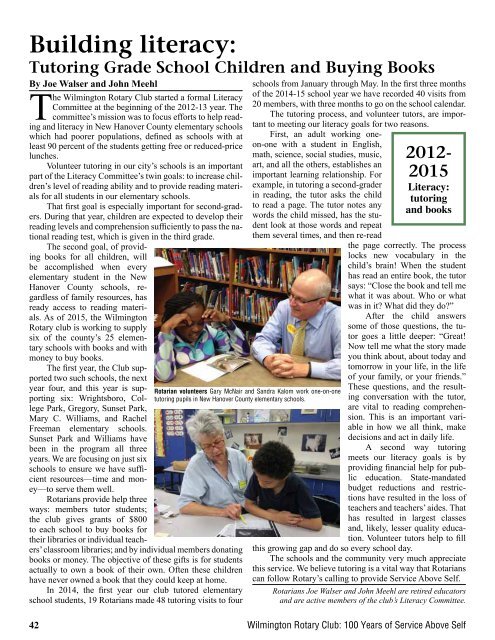Wilmington Rotary Club
Wilmington Rotary Club was establiished in 1915 and - 100 Year Anniversary of service above Self
Wilmington Rotary Club was establiished in 1915 and - 100 Year Anniversary of service above Self
Create successful ePaper yourself
Turn your PDF publications into a flip-book with our unique Google optimized e-Paper software.
Building literacy:<br />
Tutoring Grade School Children and Buying Books<br />
By Joe Walser and John Meehl<br />
The <strong>Wilmington</strong> <strong>Rotary</strong> <strong>Club</strong> started a formal Literacy<br />
Committee at the beginning of the 2012-13 year. The<br />
committee’s mission was to focus efforts to help reading<br />
and literacy in New Hanover County elementary schools<br />
which had poorer populations, defined as schools with at<br />
least 90 percent of the students getting free or reduced-price<br />
lunches.<br />
Volunteer tutoring in our city’s schools is an important<br />
part of the Literacy Committee’s twin goals: to increase children’s<br />
level of reading ability and to provide reading materials<br />
for all students in our elementary schools.<br />
That first goal is especially important for second-graders.<br />
During that year, children are expected to develop their<br />
reading levels and comprehension sufficiently to pass the national<br />
reading test, which is given in the third grade.<br />
The second goal, of providing<br />
books for all children, will<br />
be accomplished when every<br />
elementary student in the New<br />
Hanover County schools, regardless<br />
of family resources, has<br />
ready access to reading materials.<br />
As of 2015, the <strong>Wilmington</strong><br />
<strong>Rotary</strong> club is working to supply<br />
six of the county’s 25 elementary<br />
schools with books and with<br />
money to buy books.<br />
The first year, the <strong>Club</strong> supported<br />
two such schools, the next<br />
year four, and this year is supporting<br />
six: Wrightsboro, College<br />
Park, Gregory, Sunset Park,<br />
Mary C. Williams, and Rachel<br />
Freeman elementary schools.<br />
Sunset Park and Williams have<br />
been in the program all three<br />
years. We are focusing on just six<br />
schools to ensure we have sufficient<br />
resources—time and money—to<br />
serve them well.<br />
Rotarians provide help three<br />
ways: members tutor students;<br />
the club gives grants of $800<br />
to each school to buy books for<br />
their libraries or individual teachers’<br />
classroom libraries; and by individual members donating<br />
books or money. The objective of these gifts is for students<br />
actually to own a book of their own. Often these children<br />
have never owned a book that they could keep at home.<br />
In 2014, the first year our club tutored elementary<br />
school students, 19 Rotarians made 48 tutoring visits to four<br />
schools from January through May. In the first three months<br />
of the 2014-15 school year we have recorded 40 visits from<br />
20 members, with three months to go on the school calendar.<br />
The tutoring process, and volunteer tutors, are important<br />
to meeting our literacy goals for two reasons.<br />
First, an adult working oneon-one<br />
with a student in English,<br />
math, science, social studies, music,<br />
art, and all the others, establishes an<br />
important learning relationship. For<br />
example, in tutoring a second-grader<br />
in reading, the tutor asks the child<br />
to read a page. The tutor notes any<br />
words the child missed, has the student<br />
look at those words and repeat<br />
them several times, and then re-read<br />
Rotarian volunteers Gary McNair and Sandra Kalom work one-on-one<br />
tutoring pupils in New Hanover County elementary schools.<br />
2012-<br />
2015<br />
Literacy:<br />
tutoring<br />
and books<br />
the page correctly. The process<br />
locks new vocabulary in the<br />
child’s brain! When the student<br />
has read an entire book, the tutor<br />
says: “Close the book and tell me<br />
what it was about. Who or what<br />
was in it? What did they do?”<br />
After the child answers<br />
some of those questions, the tutor<br />
goes a little deeper: “Great!<br />
Now tell me what the story made<br />
you think about, about today and<br />
tomorrow in your life, in the life<br />
of your family, or your friends.”<br />
These questions, and the resulting<br />
conversation with the tutor,<br />
are vital to reading comprehension.<br />
This is an important variable<br />
in how we all think, make<br />
decisions and act in daily life.<br />
A second way tutoring<br />
meets our literacy goals is by<br />
providing financial help for public<br />
education. State-mandated<br />
budget reductions and restrictions<br />
have resulted in the loss of<br />
teachers and teachers’ aides. That<br />
has resulted in largest classes<br />
and, likely, lesser quality education.<br />
Volunteer tutors help to fill<br />
this growing gap and do so every school day.<br />
The schools and the community very much appreciate<br />
this service. We believe tutoring is a vital way that Rotarians<br />
can follow <strong>Rotary</strong>’s calling to provide Service Above Self.<br />
Rotarians Joe Walser and John Meehl are retired educators<br />
and are active members of the club’s Literacy Committee.<br />
42 <strong>Wilmington</strong> <strong>Rotary</strong> <strong>Club</strong>: 100 Years of Service Above Self



